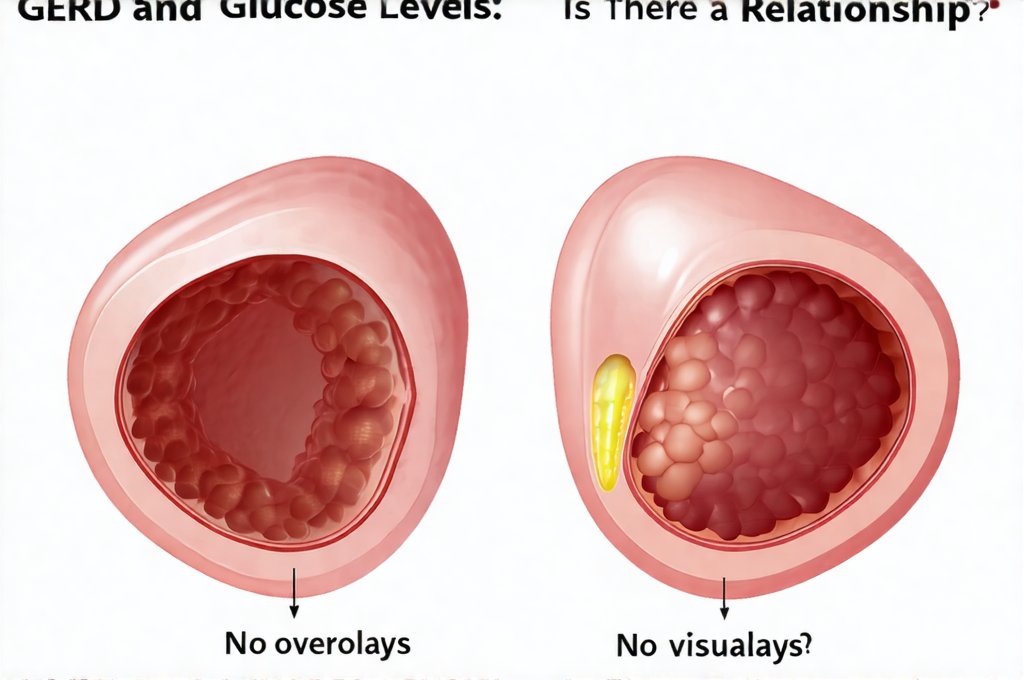Gastroesophageal reflux disease (GERD), commonly experienced as heartburn or acid reflux, affects millions worldwide. It’s often perceived as a digestive issue solely related to stomach acid irritating the esophagus. However, emerging research suggests a more complex interplay between GERD and metabolic factors, particularly glucose levels. The conventional understanding of GERD is evolving, with growing recognition that it’s not just about what we eat, but also how our bodies process what we eat – and how effectively blood sugar is managed plays a significant role in this process. This connection isn’t always straightforward; it’s a bidirectional relationship where GERD can potentially influence glucose metabolism and conversely, fluctuating glucose levels may exacerbate or even trigger GERD symptoms.
The link between these two conditions stems from several interconnected physiological mechanisms. The lower esophageal sphincter (LES), the muscle that prevents stomach acid from flowing back up into the esophagus, is sensitive to hormonal and neurological signals, some of which are influenced by blood sugar fluctuations. Furthermore, chronic inflammation, a hallmark of both GERD and poorly managed diabetes or insulin resistance, contributes to impaired LES function and increased susceptibility to reflux. Understanding this connection can empower individuals with either condition to proactively manage their health and potentially mitigate symptoms through lifestyle adjustments and informed medical care. It’s crucial to remember that self-diagnosis is never recommended; consulting a healthcare professional remains paramount for accurate assessment and personalized treatment plans. Considering the impact of diet, you might also want to explore gut brain connection in intolerance.
The Impact of Glucose Levels on GERD Symptoms
The relationship between high glucose levels (hyperglycemia) and GERD isn’t simply about cause and effect, but rather a complex interaction involving several factors. Chronically elevated blood sugar, often seen in individuals with diabetes or insulin resistance, can directly impact the function of the LES. High glucose levels are known to impair neuropathy, which is nerve damage that affects various body functions, including those controlling the digestive system. This neuropathy can weaken the LES, making it less effective at preventing acid reflux. Moreover, hyperglycemia slows gastric emptying – the rate at which food leaves the stomach – increasing the volume of stomach contents and thus the likelihood of reflux episodes.
Beyond direct effects on the LES, hyperglycemia promotes inflammation throughout the body. Chronic inflammation is a major contributor to GERD symptoms as it weakens the esophageal lining and increases sensitivity to acid exposure. This creates a vicious cycle where inflammation exacerbates reflux, leading to further inflammation and discomfort. It’s also important to note that certain medications used to manage diabetes, such as some GLP-1 receptor agonists (while generally beneficial), can occasionally cause gastrointestinal side effects that might mimic or worsen GERD symptoms in some individuals. If you are concerned about underlying causes, is there a test for leaky gut syndrome may be helpful to explore.
Finally, the dietary patterns often associated with poor glucose control – high intake of processed foods, sugary drinks, and unhealthy fats – are also known to trigger GERD symptoms. These foods can increase acid production in the stomach and relax the LES, further contributing to reflux episodes. Therefore, managing glucose levels is not only about preventing diabetes; it’s about supporting overall digestive health and potentially reducing the frequency and severity of GERD symptoms. You should also consider whether is coconut a common digestive trigger for you.
How GERD Might Influence Glucose Metabolism
While we often think of blood sugar being affected by diet and lifestyle, there’s growing evidence that chronic GERD itself can impact glucose metabolism. This occurs primarily through the systemic inflammation triggered by frequent acid exposure to the esophagus and potentially even beyond. Chronic inflammation is a key player in the development of insulin resistance, where cells become less responsive to insulin’s signal to absorb glucose from the bloodstream. As a result, blood sugar levels remain elevated, increasing the risk of prediabetes and type 2 diabetes.
The inflammatory response triggered by GERD also affects the gut microbiome – the community of microorganisms living in our digestive tract. An imbalance in the gut microbiome (dysbiosis) has been linked to insulin resistance and impaired glucose control. The constant irritation and inflammation from reflux can disrupt the delicate balance of gut bacteria, promoting the growth of harmful species and reducing the diversity necessary for optimal metabolic health.
Furthermore, individuals with GERD may experience altered sleep patterns due to nighttime symptoms like heartburn or regurgitation. Sleep deprivation is known to negatively impact glucose metabolism, leading to increased insulin resistance and impaired blood sugar control. This creates another feedback loop where GERD disrupts sleep, which then worsens glucose levels, potentially exacerbating GERD symptoms further. It’s important to remember that is there a connection between gut health and anxiety can also play a role in these conditions.
The Role of Lifestyle Modifications
Addressing the interplay between GERD and glucose levels requires a holistic approach focused on lifestyle modifications. Dietary changes are paramount:
- Focus on Low-Glycemic Index (GI) Foods: Choosing foods that cause slower and more gradual increases in blood sugar – like whole grains, non-starchy vegetables, and lean proteins – helps stabilize glucose levels and reduces the risk of reflux.
- Limit Trigger Foods: Identify and minimize consumption of common GERD triggers such as fatty foods, chocolate, caffeine, alcohol, spicy foods, and acidic fruits/vegetables. This is highly individual; keeping a food diary can help pinpoint specific sensitivities.
- Portion Control & Meal Timing: Smaller, more frequent meals put less stress on the digestive system and reduce the likelihood of overfilling the stomach, minimizing reflux. Avoid eating large meals close to bedtime.
Beyond diet, regular physical activity is essential for improving insulin sensitivity and managing weight, both crucial factors in glucose control and GERD management. Aim for at least 30 minutes of moderate-intensity exercise most days of the week. Stress management techniques – such as yoga, meditation, or deep breathing exercises – can also play a role, as stress often exacerbates both GERD symptoms and blood sugar fluctuations. In addition to diet, consider is there a best time to take probiotics for optimal gut health.
Medication Considerations & Monitoring
It’s crucial to understand that medications used for GERD don’t always address the underlying connection with glucose levels. Proton pump inhibitors (PPIs), commonly prescribed for acid reflux, while effective at reducing stomach acid production, can potentially have unintended consequences on nutrient absorption and may even slightly affect glucose metabolism in some individuals. Therefore, long-term PPI use should be carefully evaluated by a healthcare professional, considering the individual’s overall health profile and risk factors.
Regular monitoring of blood sugar levels is essential for anyone with GERD, especially those with pre-existing diabetes or insulin resistance. This can involve periodic A1C testing (which provides an average glucose level over 2-3 months) as well as self-monitoring using a glucose meter if recommended by a healthcare provider. Open communication with your doctor about any changes in symptoms or medication side effects is also crucial to ensure optimal management of both conditions. Is constipation a sign of food intolerance should also be considered when evaluating digestive issues.
Future Research & Emerging Trends
Research into the GERD-glucose connection is ongoing, and several exciting areas are emerging. Studies exploring the role of the gut microbiome in mediating this relationship are gaining traction, suggesting that interventions aimed at restoring a healthy gut flora – such as probiotic supplementation or dietary changes – could potentially improve both glucose control and GERD symptoms.
Furthermore, researchers are investigating the impact of different types of carbohydrates on reflux and blood sugar levels, aiming to identify optimal dietary strategies for individuals with both conditions. The development of more targeted therapies that address both inflammation and LES function is also a key area of focus. Ultimately, recognizing the interconnectedness between GERD and glucose metabolism represents a paradigm shift in how we approach these common health concerns, moving beyond symptom management towards a more holistic and preventative healthcare model. It’s clear that prioritizing metabolic health isn’t just about preventing diabetes; it’s about supporting overall digestive wellbeing and improving quality of life for millions.


















